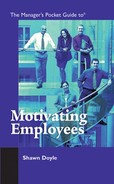Team Rewards
There are two ways a manager can reward employees: team rewards and individual rewards. There are some significant advantages and disadvantages to giving team rewards.
The advantages of team rewards are:
• The team bonds because they are working toward a common goal.
• Productivity usually rises because the more productive employees inspire the less productive employees.
• There is less absenteeism due to peer pressure.
• Communication is enhanced because it is more frequent.
The team setting for rewards can also have disadvantages:
• Some high producers don’t like working with low producers.
• There is much greater possibility of conflict.
• If the team doesn’t make the goal, there can be infighting.
• Pressure can be higher when team members are not pulling their weight.
The manager needs to decide when to reward teams and when not to, from a strategic position. The car company Saturn has had tremendous success with the team unit and reward process; other manufacturers have found less favorable results. The decision really varies with the organization and the team.
The manager must set up the goals. The goals must be very specific and measurable, in writing, and communicated clearly and often. The manager must also monitor the team’s progress. This eliminates any ambiguity.
If a team attains a goal that has been set for it, getting the reward can be very motivating and exciting. The excitement that results from reaching a team goal is contagious.
I once attended a team-building session that was held on a “ropes” course outside. The teams were competing and participating in activities such as “high wire climbs” and “pole jumping,” which took great nerve. The spirit of 100 people all passionately competing was electrifying! If a manager can capture that kind of spirit with team rewards, then it is all worth it. Managers can also give a team reward when one was not expected, which is even more powerful.
As a side note, managers should not have teams competing against one another where one team wins and the other team loses and is humiliated. I once saw a sales contest called “steak and beans.” There were two sales teams, and they were competing in a contest to see who could sell the most in a certain time period. The winners were treated to a very fine steak dinner at an excellent restaurant. The losers were treated to a dinner of beans; that is all they were allowed. The catch was that they ate the beans sitting in the same restaurant across the table from the team eating the steaks. During the entire meal, they were teased as losers by the winners. One team was very motivated that night. The other wasn’t in too good of a mood. I don’t think negative reinforcement is motivating.
Keep in mind the rewards don’t have to be monetary or expensive. I have observed managers get a team completely pumped about a pizza party or everyone getting off two hours early on a Friday. It is not the prize that matters with regards to a reward; it is the motivating impact the reward has on the team. I have seen teams compete savagely to win T-shirts. The impact is all that matters.
